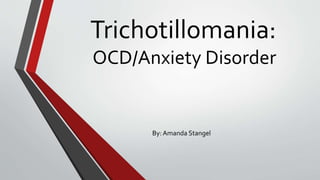
Medical PPT
- 2. Overview (OCD) OCD (ObsessiveCompulsive Disorder) • an anxiety disorder in which people have unwanted and repeated thoughts, feelings, ideas, sensations (obsessions), or behaviors that make them feel driven to do something (compulsions). • Often the person carries out the behaviors to get rid of the obsessive thoughts, but this only provides temporary relief. • Not performing the obsessive rituals can cause great anxiety. • It can destroy a person's capacity to function at work, at school, or even to lead a comfortable existence in the home.
- 3. Overview (Trichotillomania) TTM (Trichotillomania) • Recurrent, irresistible urges to pull out hair from your scalp, eyebrows or other areas of your body, despite trying to stop. (Skin picking) • Hair pulling from the scalp often leaves patchy bald spots. • People with trichotillomania may go to great lengths to disguise the loss of hair. • May be mild and generally manageable, or the compulsive urge to pull hair is overwhelming. • Long-term (chronic) disorder. Without treatment, symptoms can vary in severity over time. • It has been estimated that 0.5-3 percent of people will experience the condition at some point during life.
- 4. Types • Focused • Pulling hair intentionally to relieve tension or distress • pulling hair out to get relief from the overwhelming urge to pull hair. • elaborate rituals for pulling hair, such as finding just the right hair or biting pulled hairs. • Automatic • Pulling without realizing they're doing it • such as when bored, reading, or watching TV.
- 5. Signs and Symptoms • Repeatedly pulling your hair out. • Increasing sense of tension before pulling, or when you try to resist pulling. • A sense of pleasure or relief after the hair is pulled. • Shortened hair, thinned, or bald areas on areas of your body. • Preference for specific types of hair. • Biting, chewing, or eating pulled-out hair. • Playing with pulled-out hair or rubbing it across your lips or face.
- 6. Causes • The cause of trichotillomania is unclear; • like many complex disorders, trichotillomania probably results from a combination of genetic and environmental factors. • abnormalities in the natural brain chemicals of serotonin and dopamine may play a role in trichotillomania.
- 7. Medical Issues • Skin and hair damage:Constant hair pulling can cause abrasions and other damage, including infections, to the skin on your scalp or the specific area where hair is pulled, and can affect hair growth. • Hormonal changes of menstruation can worsen symptoms in women. • Hairballs: Eating your hair may lead to a large, matted hair ball (trichobezoar) in your digestive tract. Over a period of years, the hair ball can cause weight loss, vomiting, intestinal obstruction and even death. • (16 year old girl with trichotillomania since the age of 3, presented acutely with coffee-ground vomiting and abdominal pain.
- 8. Psychosocial/Psychological Issues • Emotional Distress: Many people with trichotillomania report feeling shame, humiliation and embarrassment and experience low self-esteem, depression and anxiety because of their condition.
- 9. Vocational Issues • Problems with social and job functioning: Embarrassment because of hair loss may lead to avoidance of social activities and occupational opportunities. • People with trichotillomania may wear wigs, style their hair to disguise bald patches or wear false eyelashes. Some people may avoid intimacy for fear that their condition will be discovered.
- 10. Treatment • Therapy: • BehavioralTherapy • Cognitive BehavioralTherapy • Medications: • may help to reduce the depression and any obsessive-compulsive symptoms the person may be experiencing. • Fluoxetine (Prozac) • Fluvoxamine (Luvox) • Sertraline (Zoloft) • Paroxetine (Paxil) • Clomipramine (Anafranil) • Valproate (Depakote) • Lithium Carbonate (Lithobid, Eskalith)
- 11. References • http://www.mayoclinic.org/diseases- conditions/trichotillomania/basics/definition/con-20030043 • http://www.mentalhealthamerica.net/conditions/trichotillomania-hair- pulling • https://www.psychologytoday.com/conditions/obsessive-compulsive- disorder • http://rarediseases.org/rare-diseases/trichotillomania/